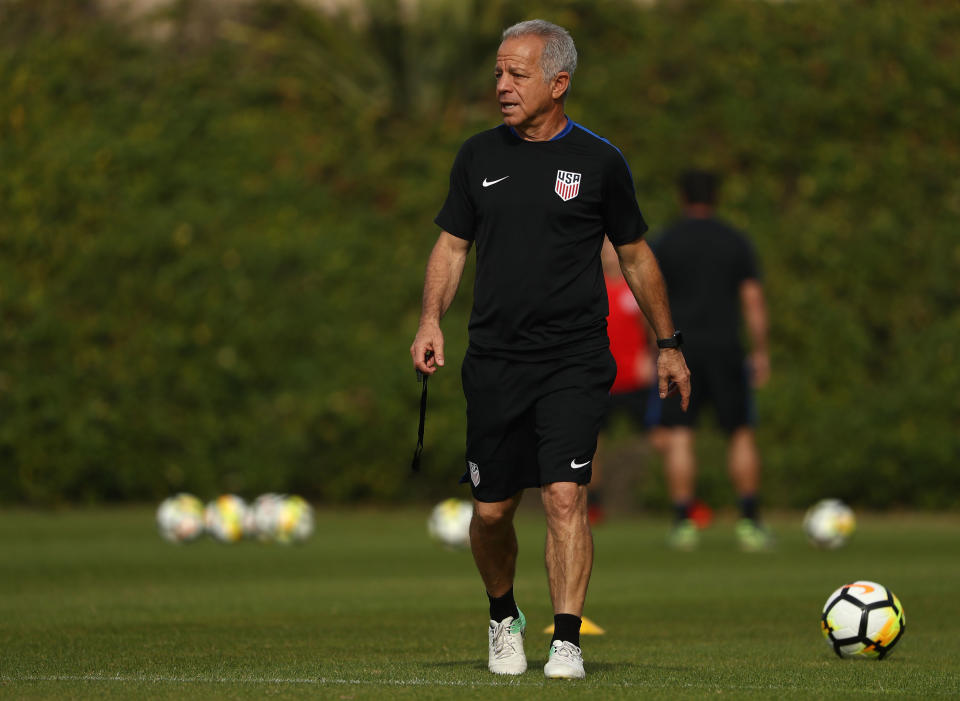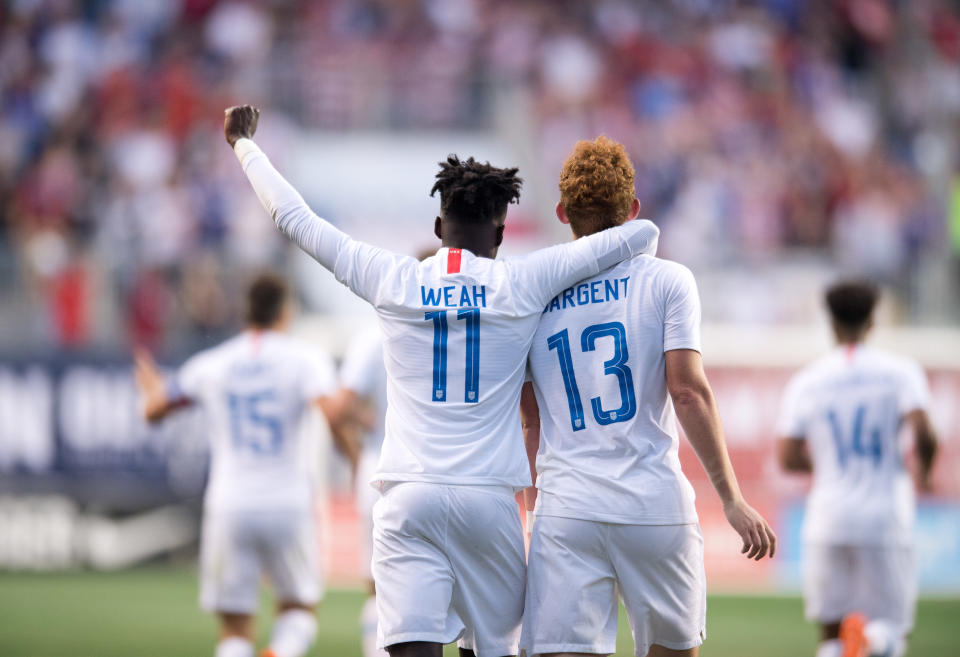How Dave Sarachan, amid paradoxical uncertainty, kick-started the USMNT’s rebuild
PHILADELPHIA — Dave Sarachan likes to call them dominoes. And no, he isn’t talking about those dotted rectangular blocks. He’s talking about decisions. About a rebuilding process. About the steps U.S. Soccer must take to move forward, away from its most traumatic night.
And more than seven months on from that night – more than six months after the 63-year-old Sarachan took charge of his first U.S. national team game – an unsettling amount of those dominoes remain upright. U.S. Soccer’s members elected Carlos Cordeiro as their new president in February, but Cordeiro has been jetting around Europe and Asia on the 2026 World Cup bid campaign trail. A general manager role has been created, but remains unfilled. A technical director role is non-existent.
“There’s a lot of uncertainty,” Sarachan admitted during a sit-down interview with Yahoo Sports last week. “There’s a lot of … chaos isn’t the right word, but trying to find their way. There’s a lot of moving parts.”
And so Sarachan, who has spent 22 of his 38 coaching years as an assistant, has effectively been on his own.
“I haven’t had anybody from up above talking to me about my job,” he says of his time as interim boss. Tactical and personnel decisions are exclusively his. He has spoken with U-20 coach Tab Ramos when youth and senior national team camps have overlapped. “But in terms of having a sounding board, or anything with U.S. Soccer,” he says, “I’ve sort of been left to do what I feel is best.”
And he’s been left in a strange position. He’s been left with the keys to a program that needs to move forward; but with a contract, twice extended by a few months, that expires at the end of June.
When it does, he wants to stay on with the federation in some capacity. But he’s been given no assurances. Meanwhile, he’s been tasked with assembling the building blocks for a future he might not be a part of.
And yet despite the paradoxical nature of what he calls a “difficult situation,” Sarachan, at the very least, has ensured that the past seven months, while perhaps directionless, haven’t been worthless.
“I don’t dwell on the fact that after June 30, I may not be in this position,” Sarachan says. “I’m not naïve. I understand there’s a good chance that will happen. But my style and philosophy of coaching … that will never change. I don’t compromise that. Because I’m not looking long term, I’m looking at bringing a group together.”
By all accounts, he’s done that. A 3-0 victory over Bolivia on Monday night may be the best evidence yet. By all accounts, he’s given the U.S. men’s national team exactly what it needed, exactly when it needed it most.
* * * * *
With the late-morning Philadelphia sun beaming and a ball zipping around a field in front of him, Sarachan is in his element. He barks out the occasional instruction, urging players to up the tempo of a possession drill. Once or twice, he calls the group together to demonstrate a technique. Sarachan, first and foremost, is a teacher. With a roster of kids, 15 of them 23 years old or younger, he’s comfortable. He’s in charge.

So hours later, sitting across from him in a quiet corner of a downtown Philadelphia hotel lobby, I can’t help but ask: Does Sarachan, given his precarious job status, feel like anything less than a full national team manager?
“It’s a fair question,” he begins. “But the answer is no.”
And his job title concurs. Back on Oct. 24, U.S. Soccer announced that “assistant coach Dave Sarachan” would “guide” the team in its first friendly post-Trinidad. When that friendly, against Portugal, rolled around, he had become “caretaker” or “acting head coach.” Now there are no modifiers. No “acting” or “caretaker” or “interim.”
“Right now, I am the senior men’s national team coach,” Sarachan says. “It’s an important position, regardless of whether you’re permanent or semi-permanent. In this business of coaching, you’re never permanent. Everybody is an interim coach. So I don’t look at it like that at all. If I did, I think that would diminish my professional responsibility.”
[Follow FC Yahoo on Twitter and Facebook]
It is natural to wonder whether Sarachan’s cloudy future, coupled with his desire to remain with a U.S. national team, has compromised his ability to kick-start the rebuild. And many have wondered. In March, many questioned his motives. They posited that Sarachan’s desire to prove himself worthy of a more permanent job morphed into a desire to win, which overrode the long-term interests of the program.
Sarachan, however, when presented with the criticism that he has not granted enough opportunities to young players, finds it absurd.
“It’s laughable to think that way,” he says. “There’s so many people out there that are misinformed, and that just don’t know what goes into the job I have, and building a team.
“National team call-ups and playing time is not just handed out. It’s not just given to guys because they’re young. In fact, it’s almost the opposite. It’s gotta be earned. These aren’t just token things because a guy plays for a big club in Europe, but he hasn’t really played, but he’s got a potential future. The idea of just giving guys minutes is just insane. And it’s not anything I would ever entertain.”
If Sarachan were approaching friendlies with the sole purpose of winning, after all, Christian Pulisic would have been in Portugal and North Carolina. Jozy Altidore and Michael Bradley would have been there as well. Sarachan mentions several times that those two are still very much in the national team picture.
“Guys like Michael Bradley and Jozy Altidore, and I could name a few others, will absolutely still be in the mix,” he says. “They’ve been unfairly criticized. Leaving them out for these games is not a reflection of [whether] I feel they’re going to be a part of the next cycle.”
Rather, it’s a reflection of his familiarity with them, and unfamiliarity with other players whom he has given opportunity. He’s doled out 21 first call-ups and 15 debuts. He’s enabled four first national team goals. His starting lineup Monday night, with an average of 22 years and 160 days, is believed to be the youngest in modern USMNT history.
These camps, he says, have been about “indoctrinating younger players,” and building relationships – even if the ones between coach and players might not last beyond June.
* * * * *
The cloud hanging over everything Sarachan has done over the past half-year is that when 20-some players arrive in New Jersey three months from now, they will, in all likelihood, report to a new manager. And that new manager could change everything – formation, style, training methods, off-field customs … everything.
So what, if anything, has Sarachan built that’s sustainable? How do we know the past seven months haven’t gone to waste?
Those are the million-dollar questions.

They’re also a reason Sarachan gathers the team almost every day after their post-training meal for a meeting. The topics vary. The overarching goal, though, is consistent.
From November to January to March to May, Sarachan says, “I’ve successively tried to build relationships, formulate ideas, so that each time the starting point is a little higher than just starting over. I’ve tried to establish, at each stop since Trinidad, what it really means to be part of the national team.
“If you have that baseline, and define the roles and responsibilities, and what it means, regardless of whether I’m coaching in July or a new guy comes in, I’d like to believe that will be [the players’] philosophy.”
Off the field, many budding relationships have flourished irrespective of coaching. Friendships initially formed on youth national teams have blossomed. Camaraderie is pulsating throughout the younger generation.
On the field, though, that generation needed guidance. Sarachan has provided it.
“He kind of has the father feel, the grandfather feel,” goalkeeper Bill Hamid says. “These guys are taking [his coaching] on board. They’re listening a lot to his information.”
The thought that this could be their last camp with Sarachan hasn’t crossed many players’ minds. Sarachan, when asked if he’s had conversations with U.S. Soccer about staying on, said, “I’ve tried. It’s hard. I’ve had a few, but there’s a lot on their plate with the GM hire and the bid. All they’ve told me is, ‘We respect you, Dave, we like what you’re doing. Let’s let this process play out.’”
A few hours later, he’s back down in the hotel lobby, just minutes after Yahoo Sports’ Doug McIntyre reported that U.S. Soccer planned to hire Earnie Stewart as that GM. I mention the news to Sarachan. As he walks away, he says with a half-smile: “Dominoes are falling.”
He does not know what the future holds. But the past seven months, he says, have been “refreshing.” They’ve been “an honor.” He’s even “enjoyed it.”
And he’s proud. “I feel good that we’ve tried to turn the page and move forward,” he says. “I feel I was the right person at the right time, with the calmness and the experience” required to steady the program during one of the most turbulent times in its history. Monday’s performance would suggest he’s done just that.
“Dave and his staff have started something special,” Hamid says, the prospect of a new manager replacing Sarachan now brought to his attention. “Breaking it would … it would almost suck a little bit.”
– – – – – – –
Henry Bushnell covers global soccer for Yahoo Sports. Have a tip? Question? Comment? Email him at henrydbushnell@gmail.com, or follow him on Twitter @HenryBushnell, and on Facebook.
More soccer from Yahoo Sports:
• 2018 World Cup preview hub
• Notes, quotes and takeaways from U.S. 3, Bolivia 0
• Sources: Stewart finalizing deal to become USMNT’s first GM
• Julian Green: Enigma? Or ‘just a normal guy’?
• USMNT’s next generation is sprouting before our eyes


